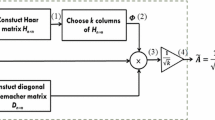Abstract
The singular value decomposition (SVD) has a crucial role in model order reduction. It is often utilized in the offline stage to compute basis functions that project the high-dimensional nonlinear problem into a low-dimensional model which is then evaluated cheaply. It constitutes a building block for many techniques such as the proper orthogonal decomposition (POD) and dynamic mode decomposition (DMD). The aim of this work is to provide an efficient computation of low-rank POD and/or DMD modes via randomized matrix decompositions. This is possible due to the randomized singular value decomposition (rSVD) which is a fast and accurate alternative of the SVD. Although this is considered an offline stage, this computation may be extremely expensive; therefore, the use of compressed techniques drastically reduce its cost. Numerical examples show the effectiveness of the method for both POD and DMD.
Similar content being viewed by others
References
Alla, A., Nathan Kutz, J.: Nonlinear model reduction via dynamic mode decomposition. SIAM J. Sci. Comput. 39, B778–B796 (2017)
Barrault, M., Maday, Y., Nguyen, N.C., Patera, A.T.: An empirical interpolation method: application to efficient reduced-basis discretization of partial differential equations Comptes Rendus Mathematique, 339, pp. 667–672 (2004)
Benner, P., Gugercin, S., Willcox, K.: A survey of Projection-Based model reduction methods for parametric dynamical systems. SIAM Rev. 57, 483–531 (2015)
Brunton, S.L., Proctor, J.L., Kutz, J.N.: Compressive sampling and dynamic mode decomposition. J. Comp. Dyn. 2, 165–191 (2015)
Chatarantabut, S., Sorensen, D.: Nonlinear model reduction via discrete empirical interpolation. SIAM J. Sci. Comput. 32, 2737–2764 (2010)
Drineas, P., Mahoney, M.W.: RandNLA: randomized numerical linear algebra. Communications of the ACM 59.6, 80–90 (2016)
Drmac, Z., Gugercin, S.: A new selection operator for the discrete empirical interpolation method - improved a priori error bound and extensions. SIAM J. S.i. Comput. 38, A631–A648 (2016)
Duersch, J., Gu, M. (2015)
Erichson, N.B., Voronin, S., Brunton, S.L., Kutz, J.N.: Randomized matrix decompositions using R, arXiv:1608.02148 (2016)
Everson, R., Sirovich, L.: Karhunen-loéve procedure for gappy data. J. Opt. Soc. Am. A 12, 1657–1664 (1995)
Frieze, A., Ravi, K., Vempala, S.: Fast Monte-Carlo algorithms for finding low-rank approximations. Journal of the ACM (JACM) 51.6, 1025–1041 (2004)
Gavish, M., Donoho, D.L.: The optimal hard threshold for singular values is \(4/\sqrt {3}\). IEEE Trans Inform. Theory 60, 5040–5053 (2014)
Halko, N., Martinsson, P.-G., Tropp, J.: Finding structure with randomness: probabilistic algorithms for constructing approximate matrix decompositions. SIAM Rev. 53, 217–288 (2011)
Isaac, T., Petra, N., Stadler, G., Ghattas, O.: Scalable and efficient algorithms for the propagation of uncertainty from data through inference to prediction for large-scale problems, with application to flow of the Antarctic ice sheet. J. Comp. Phys. 296, 348–368 (2015)
Koopman, B.O.: Hamiltonian systems and transformation in hilbert space. PNAS 17, 315–318 (1931)
Kutz, J.N., Brunton, S., Brunton, B., Proctor, J.: Dynamic mode decomposition: Data-driven modeling of complex systems. SIAM Press (2016)
Liberty, E., Woolfe, F., Martinsson, P.-G., Rokhlin, V.: Randomized algorithms for the low-rank approximation of matrices. Proc. Natl. Acad. Sci. 104, 20167–20172 (2007)
Mahoney, M.W.: Randomized algorithms for matrices and data. Found. Trends Mach. Learn. 3.2, 123–224 (2011)
Martinsson, P.-G.: factorizations, blocked rank-revealing QR: how randomized sampling can be used to avoid single-vector pivoting. arXiv:1505.08115 (2015)
Martinsson, P.-G., Rokhlin, V., Tygert, M.: A randomized algorithm for the decomposition of matrices. Appl. Comput. Harmon. Anal. 30, 47–68 (2011)
Martinsson, P.-G.: Randomized methods for matrix computations and analysis of high dimensional data, arXiv:1607.01649 (2016)
Martinsson, P.-G., Quintana-Orti, G., Heavner, N.: randUTV: A blocked randomized algorithm for computing a rank-revealing UTV factorization, arXiv:1703.00998 (2017)
Mezić, I., Banaszuk, A.: Comparison of systems with complex behavior. Physica D: Nonlinear Phenomena 197, 101–133 (2004)
Mezić, I.: Spectral properties of dynamical systems, model reduction and decompositions. Nonlinear Dyn. 41, 309–325 (2005)
Mezić, I.: Analysis of fluid flows via spectral properties of the Koopman operator. Annu. Rev. Fluid Mech. 45, 357–378 (2013)
Sirovich, L.: Turbulence and the dynamics of coherent structures. Parts I-II Q. Appl. Math. XVL, 561–590 (1987)
Szlam, A., Kluger, Y., Tygert, M.: An implementation of a randomized algorithm for principal component analysis, arXiv:1412.3510(2014)
Tu, J., Rowley, C., Luchtenberg, D., Brunton, S., Kutz, J.N.: On dynamic mode decomposition theory and applications. J. Comput. Dyn. 1, 391–421 (2014)
Volkwein, S.: Model Reduction Using Proper Orthogonal Decomposition. Lecture Notes, University of Konstanz (2013)
Voronin, S., Martinsson, P.-G.: RSVDPACK: Subroutines for computing partial singular value decompositions via randomized sampling on single core, multi core, and GPU architectures, arXiv:1502.05366 (2015)
Woolfe, F., Liberty, E., Rokhlin, V., Tygert, M.: A fast randomized algorithm for the approximation of matrices. Appl. Comput. Harmon. Anal. 25, 335–366 (2008)
Zahm, O., Nouy, A.: Interpolation of inverse operators for precoditioning parameter-dependent equations. SIAM J. Sci. Comput. 38, 1004–1074 (2016)
Funding
This study is supported by the Department of Energy (grant no. DE-SC0009324) and the U.S. Air Force Office of Scientific Research (FA9550-15-1-0385).
Author information
Authors and Affiliations
Corresponding author
Additional information
Communicated by: Anthony Patera
Publisher’s note
Springer Nature remains neutral with regard to jurisdictional claims in published maps and institutional affiliations.
Rights and permissions
About this article
Cite this article
Alla, A., Kutz, J.N. Randomized model order reduction. Adv Comput Math 45, 1251–1271 (2019). https://doi.org/10.1007/s10444-018-09655-9
Received:
Accepted:
Published:
Issue Date:
DOI: https://doi.org/10.1007/s10444-018-09655-9
Keywords
- Nonlinear dynamical systems
- Proper orthogonal decomposition
- Dynamic mode decomposition
- Randomized linear algebra




